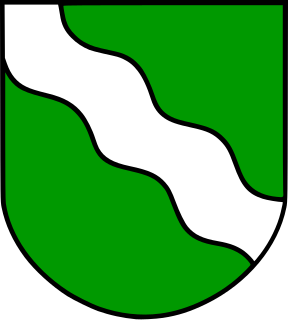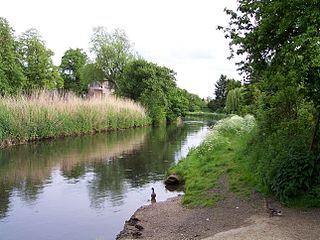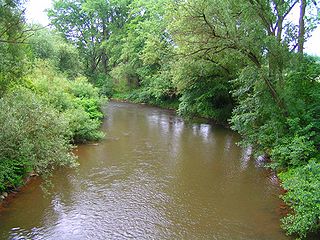
Westphalia is a region in northwestern Germany and one of the three historic parts of the state of North Rhine-Westphalia. It has an area of 20,208 km2 (7,802 sq mi) and 7.9 million inhabitants.

The Rhineland is the name used for a loosely defined area of Western Germany along the Rhine, chiefly its middle section.
Minden-Lübbecke is a Kreis (district) in the northeastern part of North Rhine-Westphalia, Germany. Neighboring districts are Diepholz, Nienburg, Schaumburg, Lippe, Herford, Osnabrück.
The Rhein-Sieg-Kreis is a Kreis (district) in the south of North Rhine-Westphalia, Germany. Neighboring districts are Rheinisch-Bergischer Kreis, Oberbergischer Kreis, Altenkirchen, Neuwied, Ahrweiler, Euskirchen, Rhein-Erft-Kreis, the urban district of Cologne. The federal city of Bonn is nearly completely surrounded by the district.

The Bergisches Land is a low mountain range region within the state of North Rhine-Westphalia, Germany, east of Rhine river, south of the Ruhr. The landscape is shaped by woods, meadows, rivers and creeks and contains over 20 artificial lakes. Wuppertal is one of the biggest towns and seen as the region's capital, whereas the southern part nowadays has closer economic and socio-cultural ties to Cologne. Wuppertal and the neighbouring cities of Remscheid, Solingen form the Bergisches Städtedreieck.

The Sieg is a river in North Rhine-Westphalia and Rhineland-Palatinate, Germany. It is a right tributary of the Rhine.
Lippe is a Kreis (district) in the east of North Rhine-Westphalia, Germany. Neighboring districts are Herford, Minden-Lübbecke, Höxter, Paderborn, Gütersloh, and district-free Bielefeld, which forms the region Ostwestfalen-Lippe.

The Siegerland is a region of Germany covering the old district of Siegen and the upper part of the district of Altenkirchen, belonging to the Rhineland-Palatinate adjoining it to the west.

The Inde is a small river in Belgium and in North Rhine-Westphalia, Germany.

The Rur or Roer is a major river that flows through portions of Belgium, Germany and the Netherlands. It is a right (eastern) tributary to the Meuse. About 90 percent of the river's course is in Germany.

The Niers is a river in Germany and The Netherlands, a right tributary of the river Maas (Meuse). Its wellspring is near Erkelenz, south of Mönchengladbach, in North Rhine-Westphalia (Germany).

The Düssel is a small right tributary of the river Rhine in North Rhine Westphalia, Germany. Its source is east of Wülfrath. It flows westward through the Neander Valley where the fossils of the first Neanderthal man were found in August 1856. At Düsseldorf it forms a river delta by splitting into four streams, which all join the Rhine after a few kilometres. The Nördliche Düssel flows through the Hofgarten and passes under the Golden Bridge.

The Oude IJssel or Issel is a river in Germany and the Netherlands approximately 82 km (51 mi) long. It is a right tributary of the river IJssel. Oude IJssel is Dutch for "Old IJssel"; the Oude IJssel was the upper course of the IJssel until the connection with the Rhine was dug, possibly in the Roman era.

The Kyll, noted by the Roman poet Ausonius as Celbis, is a 128 km long river in western Germany, left tributary of the Moselle. It rises in the Eifel mountains, near the border with Belgium and flows generally south through the towns Stadtkyll, Gerolstein, Kyllburg and east of Bitburg. It flows into the Moselle in Ehrang, a suburb of Trier.

The coat of arms of North Rhine-Westphalia is the official coat of arms of the German state of North Rhine-Westphalia.

Dhünn is a 40 km (25 mi)-long river of North Rhine-Westphalia, Germany. Its main source is near Wipperfürth in the Bergisches Land area. It runs in south-westerly direction, and its mouth into the river Wupper is near Leverkusen, appr. 10 km (6.2 mi) north of Cologne.
This page is based on this
Wikipedia article Text is available under the
CC BY-SA 4.0 license; additional terms may apply.
Images, videos and audio are available under their respective licenses.
















